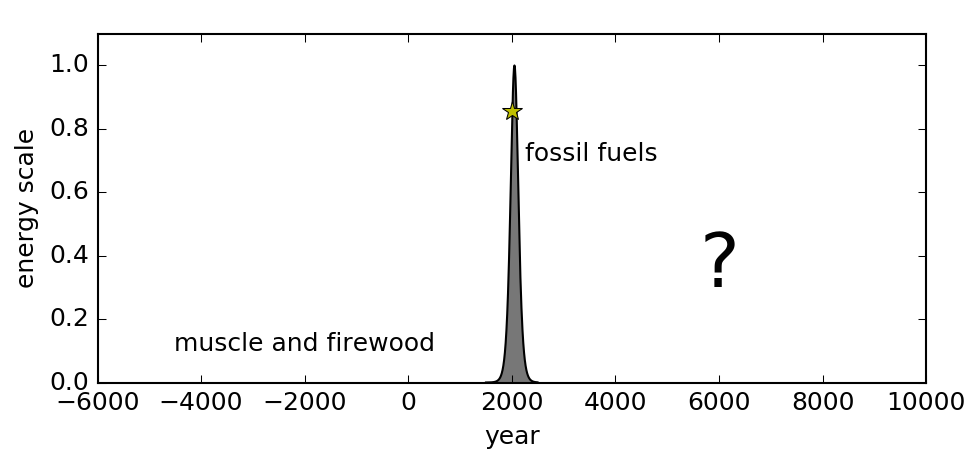Tom Murphy
The world a person is born into is taken to be normal, no matter how aberrant it might be through a wider historical lens. Our present age is exceedingly atypical in numerous ways. Energy, in particular, is an important example, as it provides the means to carry out a host of other atypical activities.
Until very recently, humans got energy from the food they ate, wood they burned, and animals they harnessed. A smattering of sunlight, water, and wind supplemented these primary forms, but the overall story was a low-energy existence, by today’s standards. Then fossil fuels came onto the scene and energy use exploded in a hockey stick (exponential) fashion. But we know that the fossil fuels are finite, and that a substantial fraction of the provision is already gone. Plotted over civilization-relevant timescales, our energy use looks like this:

It’s a very narrow, momentary phenomenon upon which we are precariously perched (yellow star). We may not know the details yet of the decline (when it starts and how fast), but we do know that the area under the curve (total resource) is finite—so we do not have the freedom to draw it in any way that we wish.
This fossil fuel spike made possible the industrial revolution, large-scale agriculture, exponential human population growth, high technology, and other features of modernity. For instance, because we use methane to create fertilizer, and petroleum to carry out industrial agriculture, we would certainly not have 8 billion people on the planet without fossil fuels. What happens when they inevitably are no longer available?
The most important and correct response is: we don’t know! We might imagine replacement with renewable energy, but we have never built solar panels, wind turbines, hydroelectric dams, or nuclear plants (not renewable) without significant inputs from fossil fuels—the burning of which produces the high temperatures needed for processing concrete, steel, and other materials in a way that is not available using electricity from renewables.
Even if technical hurdles are mastered, the extreme cost to ecological health and biodiversity—caused simply by our access to large amounts of energy so that we might clear forests, plant crops, mine materials, and generally expand the human enterprise—argues that maintaining a profligate energy profile may not be in our own long-term best interests. The human enterprise cannot withstand ecological collapse. We need to be careful not to saw off the branch we stand on. Our chainsaw running out of gas may save us, in fact.
The main point is to recognize how unusual this moment is, and that extrapolating our recent trajectory is likely to be a poor guide to the future. We might not know how we will live beyond the fossil spike, but it is more likely to be unrecognizable than familiar.
Tom Murphy is a professor emeritus of physics at UC San Diego, USA
